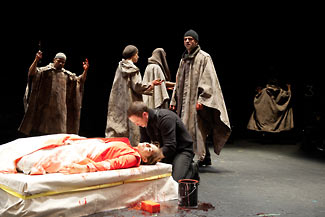In today’s Wall Street Journal I file the first of two reports from the Oregon Shakespeare Festival. This week I review three shows, Julius Caesar, Measure for Measure, and The Pirates of Penzance. Here’s an excerpt.
* * *
The modern-dress “Julius Caesar” that Orson Welles brought to Broadway in 1937 continues to cast a long shadow. By turning the play into a contemporary parable of fascism on the march, Welles raised the curtain on the high-concept production style that now dominates Shakespeare staging throughout the world. I don’t know whether Amanda Dehnert had Welles in mind when she created her own modern-dress version of “Julius Caesar” for the Oregon Shakespeare Festival, but it’s very much in the tradition of that legendary production, albeit with a few postmodern frills, foremost among them the casting of a woman actor, Vilma Silva, in the title role. It is also the best “Julius Caesar” I’ve ever seen, a stark parable of good intentions run amok that has the attention-grabbing power of a hand grenade lobbed into a crowded room.
 Performed in the round on a bare stage decorated with crudely lettered agitprop pennants and a few battered kitchen chairs, Ms. Dehnert’s “Julius Caesar” has a deceptively improvisational air. All of the roles are played by a compact ensemble of 11 actors who switch casually from part to part. It’s as if you’re watching a performance that’s been thrown together on the spot—but Robert Peterson’s ultra-meticulous lighting design leaves no doubt of the forethought that has gone into this production. Every detail registers with ideal clarity, yet it never feels as though the play is being bent out of shape to make anachronistic political points….
Performed in the round on a bare stage decorated with crudely lettered agitprop pennants and a few battered kitchen chairs, Ms. Dehnert’s “Julius Caesar” has a deceptively improvisational air. All of the roles are played by a compact ensemble of 11 actors who switch casually from part to part. It’s as if you’re watching a performance that’s been thrown together on the spot—but Robert Peterson’s ultra-meticulous lighting design leaves no doubt of the forethought that has gone into this production. Every detail registers with ideal clarity, yet it never feels as though the play is being bent out of shape to make anachronistic political points….
Bill Rauch, Oregon Shakespeare’s artistic director, is equally enamored of high-concept productions, and no less adept than Ms. Dehnert at charging his concepts with theatrical life—though on paper they sometimes seems obvious to the point of triteness. I mean, who wants to sit through a “Measure for Measure” that’s set in a sterile-looking corporate meeting room at the dawn of the leisure-suit era? Capitalism, boo! Humanism, yay! But Mr. Rauch knows his business, and this smart, swift, refreshingly unpredictable “Measure” is one of his finest efforts yet. Not only is every detail of the transposition from Vienna circa 1600 to corporate America circa 1970 worked out with rigorous comic logic, but the cast is fabulously good, especially Stephanie Beatriz, who plays Isabella with spitfire energy. Mr. Rauch’s Vienna, by the way, is a bilingual border town, and the incidental music is supplied by Las Colibrí, a terrific all-female mariachi trio from Los Angeles whose pungently melancholy songs are a major contribution to the total effect of the production.
Mr. Rauch’s version of “The Pirates of Penzance” is another superior staging, a farcical romp that benefits from the lively choreography of Randy Duncan and the riotously colorful costumes of Deborah M. Dryden. Even the 14-piece orchestra, led by Daniel Gary Busby, plays exceptionally well, a rarity for a regional-theater musical, and the singing, if far from operatic, is more than serviceable….
* * *
Read the whole thing here.
The members of Las Colibrí talk about their contribution to Measure for Measure:
Terry Teachout on the arts in New York City
An ArtsJournal Blog
